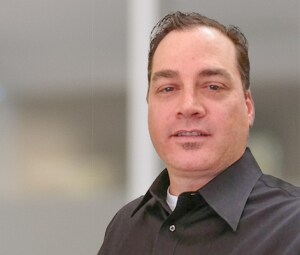Anticipating customer needs. Business development managers use their diverse experience and understanding of customer requirements and industry trends to make sure TE is always a step ahead with a product in the pipeline to meet the needs for next generation system architecture.
What does your role as a business development manager entail?
I work on the system architecture team on the mechanical side, mostly with connector design and development, designing things like board to board connectors. Often at the beginning of a project our customers don’t know exactly what they need? Backplane? Midplane? We use our expertise to help steer them in the right direction.
Did you start your career in datacom?
I’ve been doing this for about ten years, but I began working with servers, network hardware, switches, rackmount solutions, and other sub systems. I rely on that experience to aid customers in finding different ways to use our products, providing them multiple solutions that fit their needs.
Who are your customers and what challenges do they face?
Recently TE began supporting large data center customers. I work with mostly traditional networking companies. They must meet the demands of increasing speeds and data rates. To handle the requirement of more bandwidth, we have to find ways to increase the connection speed with a wider pipe or adjusting positions of connectors, or changing encoding methods.
Are there other ways TE partners with customers?
TE does a great job ensuring we have products suitable for the customer’s next need, and can expand one or two generations further. When we are proactive instead of reactive, our customers feel confident, and trust us to anticipate and understand what they need before they even know it.
What are the most difficult engineering situations you’ve had to solve?
From a mechanical standpoint probably just trying to fit a number of things into a confined space, but this leads to a lot of ideas that result in complementary products like guide pins or outlets that might otherwise be an afterthought. In my role now I get to work on a lot of things where I can provide value, which keeps things interesting.
If you weren’t in datacom, what would you do instead?
Likely building something. I worked construction in college, and it was always nice to see what your hard work produced. Sometimes I get to write some software – I get that same feeling of accomplishment when I’ve finished a program. In my free time I like to be outdoors skiing, scuba diving, and backpacking.
Anticipating customer needs. Business development managers use their diverse experience and understanding of customer requirements and industry trends to make sure TE is always a step ahead with a product in the pipeline to meet the needs for next generation system architecture.
What does your role as a business development manager entail?
I work on the system architecture team on the mechanical side, mostly with connector design and development, designing things like board to board connectors. Often at the beginning of a project our customers don’t know exactly what they need? Backplane? Midplane? We use our expertise to help steer them in the right direction.
Did you start your career in datacom?
I’ve been doing this for about ten years, but I began working with servers, network hardware, switches, rackmount solutions, and other sub systems. I rely on that experience to aid customers in finding different ways to use our products, providing them multiple solutions that fit their needs.
Who are your customers and what challenges do they face?
Recently TE began supporting large data center customers. I work with mostly traditional networking companies. They must meet the demands of increasing speeds and data rates. To handle the requirement of more bandwidth, we have to find ways to increase the connection speed with a wider pipe or adjusting positions of connectors, or changing encoding methods.
Are there other ways TE partners with customers?
TE does a great job ensuring we have products suitable for the customer’s next need, and can expand one or two generations further. When we are proactive instead of reactive, our customers feel confident, and trust us to anticipate and understand what they need before they even know it.
What are the most difficult engineering situations you’ve had to solve?
From a mechanical standpoint probably just trying to fit a number of things into a confined space, but this leads to a lot of ideas that result in complementary products like guide pins or outlets that might otherwise be an afterthought. In my role now I get to work on a lot of things where I can provide value, which keeps things interesting.
If you weren’t in datacom, what would you do instead?
Likely building something. I worked construction in college, and it was always nice to see what your hard work produced. Sometimes I get to write some software – I get that same feeling of accomplishment when I’ve finished a program. In my free time I like to be outdoors skiing, scuba diving, and backpacking.


